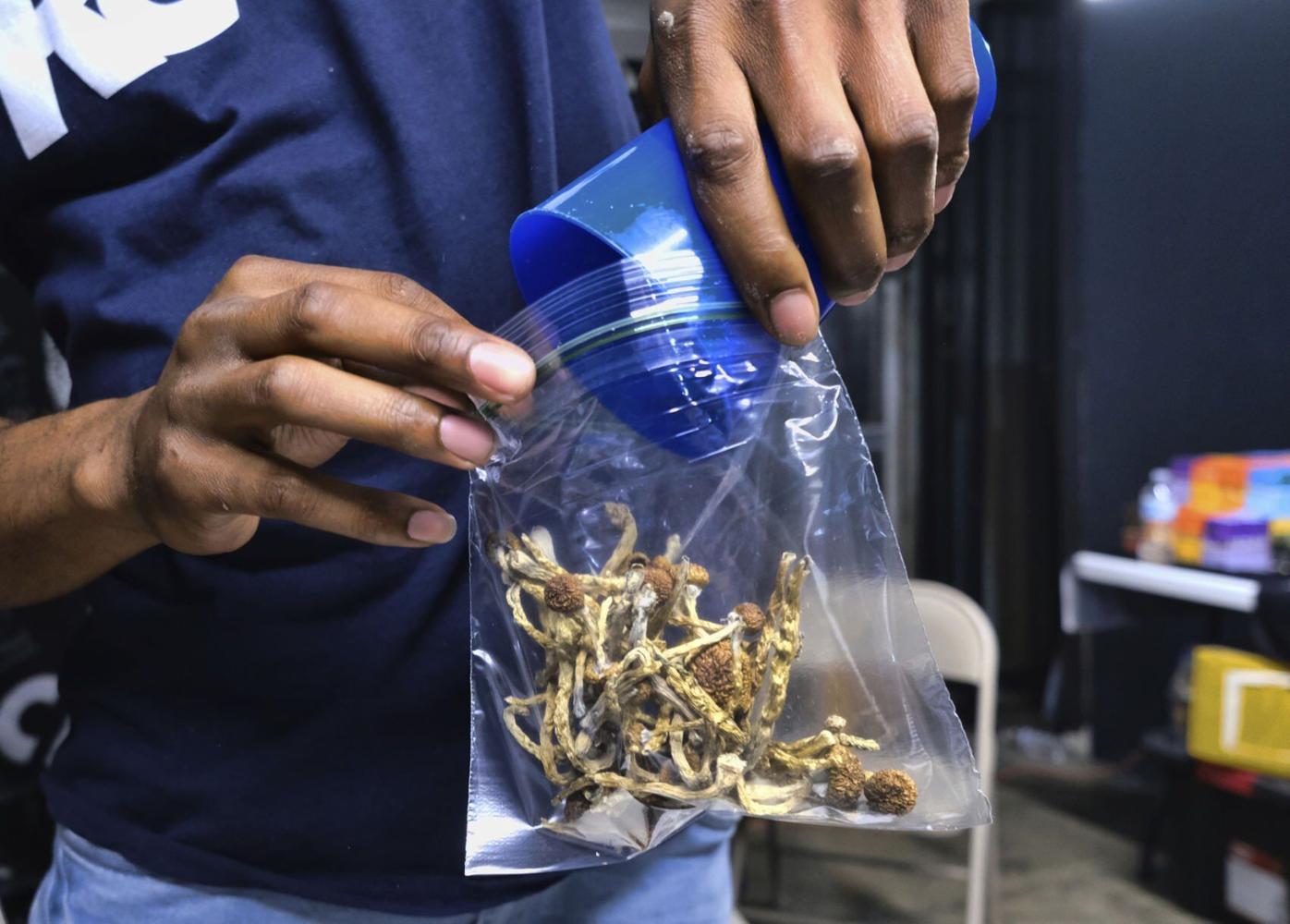‘Magic mushroom’ business regulations approved in Arapahoe County

FILE PHOTO: A vendor bags psilocybin mushrooms at a cannabis marketplace May 24, 2019, in Los Angeles. Arapahoe County Commissioners passed regulation for sale, possession and growing psilocybin "magic mushrooms" starting January 2025, when the state law legalizing them takes effect.
Associated Press
Arapahoe County commissioners on Tuesday passed a set of regulations on psilocybin and other “natural medicine” businesses as the new year — and start of Colorado’s licensing of such businesses — approaches.
Approved by voters two years ago, Proposition 122 decriminalized the possession, use and cultivation of psilocybin mushrooms, commonly known as “magic mushrooms,” making Colorado the second state in the nation to do so.
The proposition also decriminalized the use of certain plants and fungi for people 21 and older.
The state will start issuing licenses in January 2025, but the county can regulate the time, manner and place of such businesses, as long as the county’s regulations are reasonable and align with state laws.
Proposition 122 is unlike Amendment 64, which allowed retail marijuana in Colorado, in that it does not allow local jurisdictions to ban natural medicine businesses. Local jurisdictions are allowed to ban medical and recreational marijuana dispensaries and production facilities.
The new regulations come as an amendment to the county’s Land Development Code.
The regulations identify zone districts where businesses are allowed to provide services through state-licensed facilitators. Licensed centers are allowed to operate in areas zoned for office uses and other natural medicine businesses can operate in most commercial and industrial zone districts, according to the county.
Approved businesses are required to be at least 1,000 feet away from schools, preschool through high school and day care facilities.
Regulations also limit in-home cultivations of mushrooms to the state’s maximum plot size of 12 feet by 12 feet.
The county will not regulate hours of operation.
Commissioner Jessica Campbell said she is “proud” of the county for leading on the matter. She said “natural” medicine, such as psilocybin, is beneficial to treating things like post traumatic stress disorder (PTSD).
“We think about psilocybin or ‘shrooms as ‘magic mushrooms’ and the Grateful Dead and that’s all well and good … but the therapeutic properties of this medicine, one of these sessions, can actually heal or address PTSD for the effects of an entire year,” Campbell said. “To be able to have something that can prevent participation in some of those more unhealthy activities is something that we as a government have a vested interest in promoting.”
As for concerns about children getting ahold of psilocybin, which came up in public comment at a previous planning meeting, she said there are much more dangerous things, such as guns and alcohol, in people’s homes already.
“Obviously parents and adults who are cultivating this stuff in their homes, I hope they make responsible choices,” she said. “But that is part of where we are in America is people have guns in their homes, people have medicines in their homes, people have alcohol in their homes. I don’t know that this poses any greater threat and actually poses less threat than some of those other things.”
Commissioner Bill Holen said the Department of Veteran’s Affairs has been using the therapy for many years for veterans with PTSD, who find the treatment method “very, very helpful,” he said.
According to American Addiction Centers, it is possible to overdose on mushrooms — which have low toxicity — but death is unlikely.
Critics, meanwhile, insist that psilocybin is dangerous.
“It is linked with suicide and accidental deaths. A growing phenomenon called hallucinogen persisting perception disorder, characterized by ‘long-lasting condition characterized by spontaneous recurrence of visual disturbances reminiscent of acute hallucinogen intoxication’ is increasing cause for concern. Like THC, it has also been associated with psychosis,” Luke Niforatos, the executive vice president of the Foundation for Drug Policy Solutions, wrote in an opinion piece.
The regulations passed unanimously at Tuesday’s meeting, and will go into effect in January when psilocybin businesses can start operating under Colorado law.




